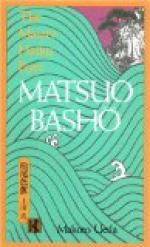|
This section contains 9,416 words (approx. 32 pages at 300 words per page) |

|
SOURCE: “Impermanence, Fate, and the Journey: Bashō and the Problem of Meaning,” in Religion, Vol. 16, No. 4, 1986, pp. 323-41.
In this essay, Barnhill considers Bashō's treatment of an abandoned baby in his travel journal The Records of a Weather-Exposed Skeleton. The critic contends that Bashō regarded the infant's suffering as one that is shared by all, an idea that appears in several other travel sketches.
The travel journals of Matsuo Bashō (1644-1694), one of Japan's great wayfaring poets, present a complex vision of the universe and a compelling way of life.1 It is generally agreed that this vision and way of life have religious significance, but what that religiosity consists of and how we can talk about it are perplexing issues.2
One passage that suggests the distinctive character of Bashō's religiosity comes near the beginning of his first journal, The Records of a Weather-Exposed Skeleton (Nozarashi Kik...
|
This section contains 9,416 words (approx. 32 pages at 300 words per page) |

|


